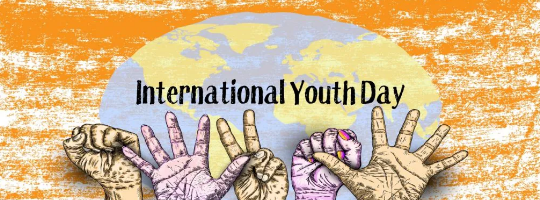Theko Tlebere
The celebration of international days has become monotonous and boring, and young people no longer feel connected to such occasions. Nevertheless, these days will continue to be celebrated.
On these days, we have an opportunity to uplift the spirits of Lesotho’s youth by recognising and celebrating their energy, creativity, and untapped potential. This year’s theme, “Youth as Catalysts for Sustainable Development,” reminds us that the future of our nation depends on its young people. It is a day to acknowledge their importance in shaping a prosperous and sustainable Lesotho.
Today, we begin by commending a well-known The Advocates for the Supremacy of the Constitution, known as “SECTION 2.” What caught my attention was the positive statement they made, expressing solidarity with the youth of Lesotho and the global community in recognising the immense potential of our young people.
They also deserve praise for acknowledging the SEBABATSO initiative, launched on October 25, 2023, by Prime Minister Samuel Ntsokoane Matekane. This initiative aims to address the high unemployment rates among our youth amidst challenging economic conditions. Its mission is to foster youth-led businesses and prepare them for local and international investment.
SEBABATSO focuses on crucial sectors such as agriculture, arts, science, technology, and tourism, emphasising the role of entrepreneurship in driving economic transformation. This initiative demonstrates the government’s commitment to youth development, providing hope and direction for many young Basotho and fostering self-reliance and innovation.
Unfortunately, my International Youth Day celebration was short-lived as I came across the long-awaited Lesotho Annual Vulnerability Assessment Report.
What shocked me the most was the significant challenges that Lesotho faces in its socio-economic context. With a population of approximately 2.3 million, a life expectancy of 56 years, and a poverty rate of 49.7 percent, the country also struggles with an unemployment rate of 22.5 percent and an inflation rate of 7.4 percent as of April 2024. Moreover, Lesotho grapples with a high prevalence of HIV at 25.6 percent and a maternal mortality rate of 618 per 10,000 births. More than 50 percent of these statistics represent the youth population, highlighting the plight faced by the youth in Lesotho.
Even though there are varying opinions about the vulnerability of Basotho and how much can be alleviated, it is crucial to examine the key findings from the vulnerability report. By doing so, we can build on the hope of Lesotho’s youth for the future.
One major factor contributing to food and nutrition insecurity in Lesotho is climate-related shocks, which have caused significant damage to crops and infrastructure. Additionally, pests and livestock diseases have worsened the situation. During the 2023/24 rainy season, dry spells induced by El Niño resulted in a 32 percent decrease in planted areas compared to the previous season.
This led to the lowest yield since 2018/19, leaving many households with insufficient food supplies that will only last for about three months.
The rising cost of living puts further strain on household budgets, with the Minimum Expenditure Basket increasing to M3,387.89 per month for a family of four. The Food Consumption Score indicates poor consumption for 19 percent of households, especially those affected by HIV.
According to the IPC Acute Food Insecurity Analysis, it is predicted that from May to September 2024, 293,000 people in rural areas will experience crisis-level food insecurity (IPC3+). This number will then increase to 403,000 people from October 2024 to March 2025. The ECMEN assessment reveals that in urban areas, 296,049 people will face food insecurity. Therefore, the total number of food-insecure individuals for the 2024/25 consumption year is estimated to be 699,049, which represents a 17 percent increase from the previous year.
Given these challenges, the African Youth Charter (AYC) and Lesotho’s National Youth Development Plan (NYDP) play crucial roles in empowering the country’s youth. The AYC provides a legal framework that supports youth rights and empowerment across the entire continent. It emphasises the significance of education, employment, and political participation, urging governments to create favourable environments for young people to thrive.
Complementing the AYC, the NYDP specifically addresses the unique challenges faced by Basotho youth. It focuses on education, entrepreneurship, and employment, encouraging young people to actively participate in the nation’s development. More than just a plan, the NYDP calls for young people to seize opportunities, innovate, and contribute to the growth of Lesotho.
The youth of Lesotho are growing increasingly restless as slow progress tests their patience. We must not underestimate their discontent. History has shown that when young people unite, they can ignite movements that change nations. The Kenyan Youth uprising serves as a powerful reminder. Lesotho stands at a crossroads. We can either risk further unrest by continuing to delay or take bold action to empower our youth and secure our nation’s future.
In these challenging times, it is important for the government to make compassionate and far-sighted decisions. This is a critical moment for the youth of Lesotho.
SECTION 2 highlights the urgency of compassionate governance that listens to young voices and bridges the gap between potential and opportunity. The youth of Lesotho are not only the leaders of tomorrow but also the change-makers of today. They will confront the challenges of our time – such as climate change, economic inequality, and social injustice – with their creativity, resilience, and commitment to justice.
The socio-economic shocks in Lesotho, including job losses, decreased opportunities, price hikes, and high inflation, have significantly reduced household incomes and weakened purchasing power.
It is recommended to provide immediate humanitarian assistance to households in crisis in rural areas and those below the Minimum Expenditure Basket in urban areas. Supporting local farmers through local purchases, agricultural input subsidies, and appropriate crop varieties is crucial. It is also essential to intensify Integrated Catchment Management, conduct vaccination campaigns, and implement the National Strategic Resilience framework to improve food and nutrition security and reduce vulnerability.
As we observe International Youth Day, let us reflect on our collective responsibility to empower the youth of Lesotho. To the young people of our nation: your dreams, aspirations, and actions will lay the foundations of our nation’s future.
The SEBABATSO initiative has demonstrated that progress is achievable with vision and determination. However, the journey is not yet complete. We urge policymakers, civil society, and the private sector to empower and support our youth, creating spaces for their voices to be heard and acting on their recommendations. Together, we can build a future where the dreams and aspirations of our youth become a reality The Future is Now!.
Summary
- ” What caught my attention was the positive statement they made, expressing solidarity with the youth of Lesotho and the global community in recognising the immense potential of our young people.
- Even though there are varying opinions about the vulnerability of Basotho and how much can be alleviated, it is crucial to examine the key findings from the vulnerability report.
- The total number of food-insecure individuals for the 2024/25 consumption year is estimated to be 699,049, which represents a 17 percent increase from the previous year.

Your Trusted Source for News and Insights in Lesotho!
At Newsday Media, we are passionate about delivering accurate, timely, and engaging news and multimedia content to our diverse audience. Founded with the vision of revolutionizing the media landscape in Lesotho, we have grown into a leading hybrid media company that blends traditional journalism with innovative digital platforms.






